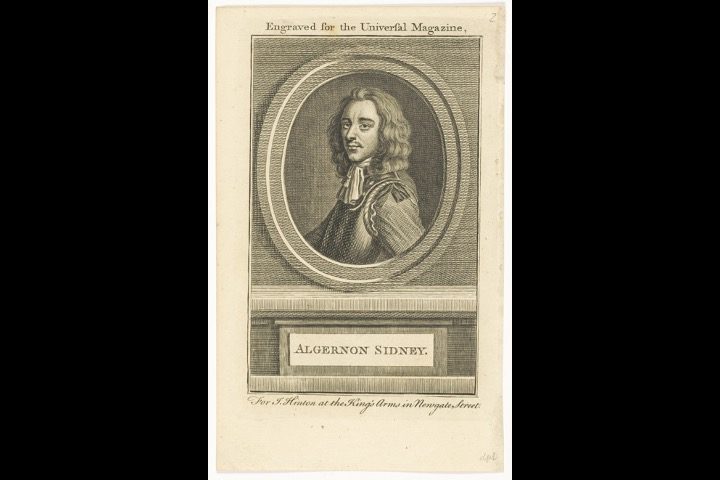
For myself, I can hardly consider the name of Algernon Sidney as anything other than an American name, — American in all its associations, and American in all its influences, — and not unworthy to be held up with the proudest and loftiest names of our own land, to the contemplation and admiration of every son and every daughter of our beloved Union. — Robert Winthrop, spoken at a Sidney memorial held in 1853 in Boston
Can you imagine that a man who Thomas Jefferson said wrote the “best elementary book of the principles of government” that our youth should read “as soon as their minds are sufficiently matured” is all but forgotten by Americans today?
Can you imagine that a book that Thomas Jefferson identified as one of the primary sources for the principles of the Declaration of Independence is not found in the home of every American patriot?
Can you imagine that a book that Jefferson and James Madison mandated that every incoming student at the University of Virginia had to read before matriculating is a book nearly no one in America today has even heard of?
Can you imagine that that book, which cost the author his head, is unknown to most U.S. history professors and teachers today?
Can you imagine that a man revered by the Founding Fathers as an honorary American and a martyr of republican government, and after whom towns and universities were named, is now almost completely unheard of?
How is that possible? How can such a man be unknown to Americans today? Regardless of how it happened, it happened, and it is just plain wrong.
Today, on the anniversary of his martyrdom — December 7, 1683 — we begin righting that wrong by restoring to the American people the knowledge of the patron saint of republicanism — of the “Good Old Cause” — Colonel Algernon Sidney.
Aside from sacred texts, it’s hard to find words more powerful than those written by Algernon Sidney (1623–1683). At the time of the War for Independence, Sidney was the world’s most celebrated martyr for free speech. Today, he is forgotten by the very people whose freedom and form of government he inspired.
While millions of Americans can recall and discuss the most minute details from the Harry Potter series or can relate intimate details from the lives of the Kardashian family, the name Algernon Sidney is never heard mentioned in our homes — even among those claiming to be advocates of republican government and experts in American history.
Remarkably, Colonel Sidney’s name and fame were once so universal that the editor of the first edition of Sidney’s Discourses Concerning Government wrote in its introduction, “It is not necessary to say anything concerning the person of the author,” and Thomas Jefferson said Sidney was so universally acclaimed that it would be “superfluous, and even presumptuous, for an individual to add his feeble breath to the gale.” Today, it is not only necessary, it is urgent, as the gale is reduced to less than a breeze.
Unbelievably, there has not been a new edition of Discourses Concerning Government printed in England since 1772 or in France since 1796, and prior to Liberty Fund’s edition in 1996, the last U.S. edition was published in 1810! This is how complete the establishment’s damnatio memoriae against Algernon Sidney has been.
As for biographies of Colonel Sidney, there has never been a comprehensive one published. Jonathan Scott’s work is the closest we’ve come, and that work is more a historiography of Sidney’s times and his influences, rather than a proper biography. I am happy to announce, however, that I am currently working on a biography of Algernon Sidney, and it should be ready for publication on the anniversary of his martyrdom in 2024.
Until that larger work is ready for publication, what follows is a brief biography of a man whose influence on the government of the United States and on the men who framed it is beyond measure.
Algernon Sidney was the second son of Robert, Earl of Leicester, and Lady Dorothy Percy, the daughter of Henry, Earl of Northumberland. His great uncle on his father’s side was the heroic and talented Sir Philip Sidney, whom Queen Elizabeth called “the jewel of her times” and whose life was famously described by Campbell as “poetry put into action.”
The exact date of Algernon’s birth is uncertain, although most scholars now agree that it was sometime on or about January 15, 1623, the date recorded of a payment made to a midwife for attending to Sidney’s mother, Dorothy, herself a descendant of the historically pertinent Percy family.
Sir William Temple described Sidney’s father as a man of profound learning and truthfulness, a sentiment echoed by Lord Clarendon and others. Under his father’s guidance, Algernon received a comprehensive, classical education, fully embracing and utilizing these opportunities. From a young age, he displayed exceptional talent and wit, as noted in a letter from his mother. [Algernon is] much commended by all that comes from you … [for] a huge deal of wit and much sweetness of nature,” she wrote to her husband.
At about 10, Algernon joined his father and elder brother on a diplomatic mission to Denmark. Four years later, they went to Paris, where Algernon’s interest in politics began to develop amid the reign of Louis XIII and Richelieu’s formidable rule. He later studied in Rome, absorbing the legacy of figures such as Brutus and Cicero.
At 19, through his father’s influence, he commanded a troop of horse in Ireland, under his brother, to quell Irish insurgents. However, military life wasn’t Algernon’s true calling. Upon returning from Ireland, he boldly supported the Parliament and the people against the king. In 1644, he became a captain in the parliamentary cavalry, and was soon promoted to lieutenant colonel. He demonstrated bravery during the Battle of Marston Moor, where he was severely injured and nearly captured, only to be saved by a soldier who refused any reward or recognition for his act of valor.
Sidney’s life and this anonymous soldier’s heroism showcase the transcendent nature of human kindness and courage, regardless of social status.
Recovering quickly, Sidney led a regiment of horse under Sir Thomas Fairfax and Oliver Cromwell, bearing the motto “The sacred love of country gives the impulse.” By age 24 he was in the House of Commons, and he was soon appointed lieutenant general of horse in Ireland and governor of Dublin Castle. Later he was made governor of Dover Castle.
In 1648, he was selected as a commissioner for King Charles I’s trial. After attending initial sessions, though, he withdrew, opposing the proceedings based on principle, as revealed in a letter in which he challenged Cromwell directly.
Despite opposing the trial, Sidney believed Charles had abused his power and that his deposition was necessary. He saw it as a warning against tyranny, aligning with the belief that monarchy should give way to a government by the people.
Refusing to support Cromwell’s increasingly tyrannical regime, Sidney spent some time in retirement, partly at Penshurst in Kent and partly in the Hague, where he befriended statesman John De Witt. During this time, he laid the groundwork for his Discourses Concerning Government.
Returning to Parliament, he was assigned as a peace mediator between Sweden and Denmark. Watching England’s political shifts from afar, he resolved to serve only if the government upheld republican principles. However, with the restoration of the monarchy under King Charles II, he refused to engage with a government he viewed as treacherous and tyrannical, declining offers for personal gain.
On August 30, 1660, Sidney wrote a letter expressing his resolve to not return to England under conditions that would compromise those principles:
I confess we are naturally inclined to delight in our own country, and I have a particular love of mine; I hope I have given some testimony of it. I think that being exiled from it is a great evil and would redeem myself from it with the loss of a great deal of my blood. But when that country of mine, which used to be esteemed a paradise, is now like to be made a stage of injury; the liberty of which we hoped to establish, oppressed; luxury and lewdness set up in its height, instead of the piety, virtue, sobriety, and modesty which we hoped God by our hands would have introduced; the best of our country made prey to the worst…. What joy can I have in my own country in this condition? Whilst I live I will endeavor to preserve my liberty, or at least not consent to the destroying of it. I hope I shall die in the same principles in which I have lived and will live no longer than they preserve me…. To conclude, the tide is not to be diverted nor the oppressed delivered, but God in his time will have mercy on his people. He will save and defend them, and avenge the blood of those who, in their pride, think nothing is able to oppose them. Happy are those whom God shall make instruments of his justice in so blessed a work.
It is this spirit and this commitment to the cause of God and of liberty that guaranteed that Algernon Sidney would be removed from the reading list in American schools.
Sidney’s letters were praised for their eloquence and sentiment, and reflect his steadfast commitment to liberty and integrity.
That courageous commitment was never more evident than in an episode during his exile, when Sidney visited a university in Copenhagen and wrote the following motto in Latin in a guest book, a phrase boldly declaring his fearless resistance to tyranny: “Manus haec inimica tyrannis einse petit placidam sub libertate quietem.”
Translated into English, Sidney’s inscription reads, “This hand, enemy to tyrants, By the sword seeks calm peacefulness with liberty.”
Remarkably, the latter half of that inscription remains the state motto of the state of Massachusetts!
Sidney’s refusal to return to England without compromising his values led him to spend many years on the Continent. He lived in various German cities and in Rome, where he faced financial difficulties and familial estrangement. Eventually, he found refuge in the villa of Belvedere near Frascati, Italy, where he devoted himself to study and solitude, finding peace in nature, reading, and reflection.
It was during this period that Sidney penned his book Court Maxims, a work that took aim at Charles II and encouraged the Dutch to lend their support to the republican cause against him. Court Maxims comprises 15 dialogues featuring discussions between the republican character Eunomius and the royal courtier Philalethes. Within these dialogues, they delve into maxims promoting political absolutism, including statements such as “monarchy is the best form of government” and “monarchy ought to be absolute and hereditary.”
Eunomius, represented by Sidney, fervently upheld the doctrine of a “higher law,” a concept previously championed by Cicero. He steadfastly argued that if rulers were to undermine the well-being of their subjects, they should no longer be regarded as benevolent figures, such as fathers or shepherds — terms associated with love and kindness — but rather as malevolent figures akin to thieves, wolves, and tyrants — the most hostile of adversaries. In the Ninth Dialogue, Sidney explains through the character Eunomius:
The essence of the law consists solely in the justice of it: if it be not just, it is not law. The justice of it depends upon the end: if it conduces not to a good end, it cannot be just. Laws are made for the right regulating and preservation of societies, and to obviate offenses tending to the disturbance thereof. Those acts or decrees which tend not thereunto have no justice in them, nor in any respect deserve the name or power of laws. Instead of landmarks to warn and prevent dangers, they become snares to catch and destroy men unawares.
Is it any wonder in the age of “plan-demics” that such plain and powerful prose would be kept from the American people? A people raised on such works, as our Founding Fathers were, would never fall for such “snares” as Covid-19 lockdowns and the economic fallout that followed them.
Despite enjoying this tranquil life, Sidney felt the need for a more active role. He left Italy, traveling through Switzerland to Brussels, but faced constant danger from royalist forces. His steadfastness to the parliamentary cause made him a target for assassination attempts, and his efforts to volunteer for military service in Hungary were thwarted by British intervention. This relentless persecution highlighted his unyielding commitment to his principles, making him a symbol of incorruptibility.
Even as Sidney’s life neared its end, he faced continued challenges and opposition. He bravely attempted to run for Parliament in Guildford, Surrey, with the support of William Penn, but faced resistance and unfair practices that led to his defeat. After a dissolved Parliament and a new election, Sidney tried again for a seat, this time in Bamber, Essex. Despite Penn’s strong backing, the election ended ambiguously, and Sidney’s candidacy was eventually dismissed.
The hostility against Sidney persisted, with accusations linking him to various plots against the government, and even a baseless charge of riot involvement. Feeling unsafe in England, he planned to return to the Continent, and even bought a property in France under a friend’s name. However, his aspirations for a peaceful retirement went unfulfilled.
In 1681, Sidney was involved in drafting a response to the “King’s Declaration,” which criticized Parliament’s repeated dissolutions. This document, revised by Sir William Jones and Lord Somers, was later published under the title, “A Just and Modest Vindication of the Proceedings of the Two Last Parliaments.” During this period, Sidney also completed his Discourses Concerning Government, a testament to his unwavering commitment to liberty.
As political tensions heightened with the prospect of a Catholic successor to the throne, Sidney and his allies, including the Duke of Monmouth, Earl Essex, and William Lord Russell, formed a secret council to oppose this succession. Though many council members faced tragic fates, their efforts laid the groundwork for the eventual Glorious Revolution of 1688.
Sidney’s involvement in these political maneuvers led to his arrest in 1683. He was charged with high treason, and his trial was a notorious miscarriage of justice, led by the infamous Judge George Jeffreys. Despite a lack of concrete evidence and in violation of the requirements for prosecuting someone for treason, Sidney was found guilty largely based on his own writings about government and liberty, writings which were illegally seized and used by the government in its prosecution and persecution of him.
At one point in the trial, Jeffreys chastised Colonel Sidney, saying, “I pray God work in you a temper fit to go unto the other world, for I see you are not fit for this.”
Sixty years old, cold, and emaciated from nearly half a year’s imprisonment, Colonel Sidney pulled up the sleeve of his prisoner’s tunic, exposing his arm to Jeffreys, and replied with dignity and defiance:
“My Lord, feel my pulse.”
“I bless God, I never was in better temper, than I am now,” he added.
After the miscarriage of justice and haughty display of judicial tyranny, Colonel Sidney was sentenced to execution by beheading. On the scaffold, his dignified and resolute demeanor was evident. There he offered a prayer, and, given the “woke” trend to identify everyone from the Enlightenment period as some sort of deist or closeted atheist, republishing a part of his final words is appropriate here, if for no other reason than to restore the affirmation of his Christianity and that of those who revered him so profoundly. Colonel Sidney said:
The Lord sanctify these my sufferings unto me and though I fall as a sacrifice unto the idols, suffer not idolatry to be established in this land. Bless thy people and save them. Defend thy own cause, and those that defend it. Stir up such as are faint. Direct those that are willing. Confirm those that waver. Give wisdom and integrity unto all. Order all things so, as may most redound unto thine own glory. Grant that I may die glorifying Thee for all thy mercies, and that at the last thou hast permitted me to be singled out as a witness of thy truth, and even by the confession of my opposers, for that Old Cause, in which I was from my youth engaged, and for which thou hast often and wonderfully declared thyself.
Those are not the words of a deist. Those are the words not only of a Christian, but of a man with confidence before the throne of Christ that he had done that which pleased his Lord.
I invite you to re-read those words and see if Sidney’s prayer is not in every syllable appropriate and applicable to the condition of the United States, their people and government, today, 340 years after being written.
The injustice of Sidney’s trial and execution was not forgotten. Within a few years, the Glorious Revolution brought about significant changes in England’s political landscape. William and Mary’s ascension to the throne under a Declaration of Right, which echoed Sidney’s ideals, marked a new era of liberty. One of their first acts was to annul Sidney’s conviction, a posthumous acknowledgment of his enduring contribution to the cause of freedom.
Sidney’s life, principles, discourses, and death had an even greater impact on the American War for Independence of 1775-1783 than on the Glorious Revolution of 1688. In fact, our revolution can be seen as the natural progression and culmination of what began in England. Of the impact of that influence on the written works produced by our Founding Fathers, Harvard University historian Bernard Bailyn stated, “Above all, they referred to the doctrines of Algernon Sidney.”
Read that again: “Above all”!
It’s in America, more than anywhere else, that Sidney’s legacy truly resonates. Here, his cherished ideal of a republic is no longer just a dream but a tangible reality, offering its immense benefits to all within its reach. This makes his unwavering commitment to liberty, his belief in a republic, and his trust in the people’s ability to govern themselves all the more relevant. Sidney’s writings and example significantly guided and motivated the founding figures of our country, contributing in unmatched measure to the creation of the institutions we cherish today.
As historian Alan Craig Houston observed:
To the colonists, the single most important fact about Sidney’s life was the manner of his death. By his unselfish devotion to liberty, Sidney set a standard against which men repeatedly measured themselves; by his martyrdom, he graphically demonstrated the evils of unchecked power. Colonial Americans also read the Discourses Concerning Government with care and precision. They cited Sidney on a wide range of issues, from the corruption of men to the rule of law, and from the representative nature of government to the right of revolution.
Sidney’s martyrdom was the most powerful piece of evidence that could have been given to verify the truth of his writings. As the latter preached, so the former graphically demonstrated the consequence of permitting one man to enjoy the arbitrary and unlimited power. Had Sidney not been a martyr, it is unlikely the Discourses would have been so widely read in eighteenth-century America; had he not written the Discourses, on the other hand, it is unlikely his death would have received the attention it did.
Sadly, after winning and securing their independence from England, Americans found increasingly less use for the revolutionary principles set forth in Discourses Concerning Government, and the book and its author were quickly erased from our cultural memory and from our history lessons.
Today, however, as we find ourselves once again facing the abolition of our liberty by tyrants, perhaps it’s time we dust off that old, worn copy of Discourses and start studying the words of Algernon Sidney once again.



